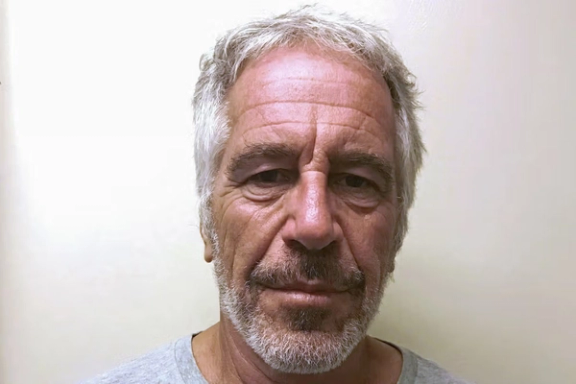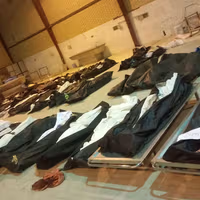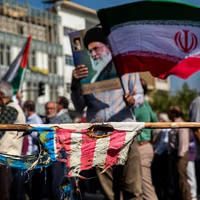Iran Plans To Create DNA Bank Of Journalists
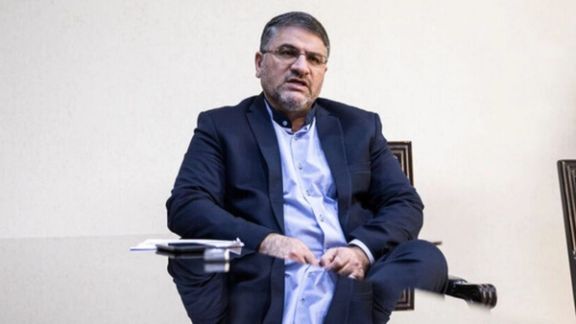
The Iranian government's plan to create a DNA bank of people in "high-risk" professions, including journalists, has raised concerns that it could be used to crack down on dissent.

The Iranian government's plan to create a DNA bank of people in "high-risk" professions, including journalists, has raised concerns that it could be used to crack down on dissent.
The plan, announced by the head of the Legal Medicine Organization of Iran, Abbas Masjedi, would involve collecting genetic samples from firefighters, flight crews, armed forces, forest rangers, mine workers, and journalists.
Masjedi said that the plan is intended to help identify victims of accidents and disasters, but critics say it could also be used to track and identify individuals who are critical of the government.
The plan can be seen as an attempt to intimidate and silence journalists because the regime can easily use of possible DNA evidence to target its critics.
The plan has also drawn comparisons to China's DNA database, which has been used to track and monitor Uyghur Muslims in Xinjiang province.
The Chinese government has shown how DNA databases can be used to suppress dissent, said Maya Wang, a senior China researcher at Human Rights Watch, suggesting that the Iranian government is taking a page out of China's playbook.
“Human Rights Watch has documented that mass collection and cataloging of people’s DNA form a part of the Chinese police’s countrywide mass surveillance systems, which involves the use of facial and voice recognition technology, big data platforms, among other technologies," she said, adding, “These technologies have empowered the Chinese government to maintain a vice-like grip on a complex society, from cities to its most remote borderlands, hunting down dissidents and neutralizing protests.”
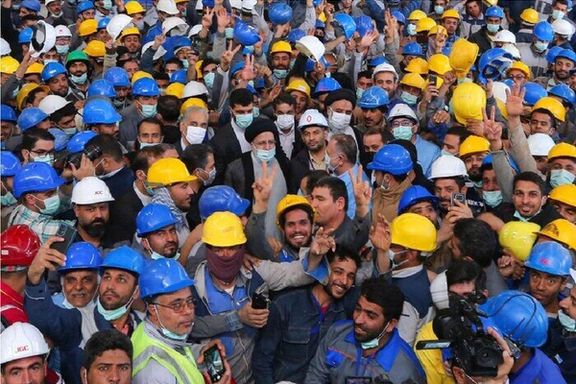
With only 17 days remaining in the current Iranian year, the country’s Supreme Labor Council has yet to convene a session to establish next year's workers' wages.
Within Iran's state-controlled economy, the government sets wages for public sector workers, including thousands of companies and factories, which also determines salaries of ordinary workers in the private sector. According to the law, representatives of the government, official labor unions and employers every year negotiate to set the minimum wage. However, the government increasingly ignores the unions and pushed through unrealistically low wages amid 40-percent annual inflation.
Davood Manzour, the head of Planning and Budget Organization (PBO), said on Saturday that discussions are still underway, with the new levels contingent on anticipated inflation.
He also expressed optimism about negotiations between labor unions and the government, though in recent months, unions have come under increasing pressure from the government amid labor protests, with tightening control over unions to suppress unrest.
This comes as Saeed Fatahi, a union leader, advocated for incorporating a 42 percent inflation rate and a 250 million rial ($400) monthly livelihood basket as benchmarks for wage deliberations. Currently, workers receive less than half of that amount, which is inadequate for food and housing.
Fatahi emphasized the need for labor representatives to hold firm during negotiations, saying any new deal should be within the terms of Article 41 of the Labor Law which states workers' wages, salaries, benefits, and bonuses must be calculated based on the country's inflation rate.

Criticism was leveled at the Labor Ministry for its handling of past wage negotiations and the dismissal of labor representatives, perceived as an attempt to suppress wage growth and disregard labor laws. As the economic crisis deepens, the government fears the stirring anger fueling ever increasing protests.
Meanwhile, Etemad newspaper on Saturday reported a staggering increase in food prices, with canned fish soaring by 113 percent and red meat by 100 percent in February compared to the previous year.
Economic constraints, such as sanctions and fluctuating oil prices, limit the government's ability to finance wage hikes without risking further economic instability. Additionally, a history of labor unrest and political dissent adds to the government's apprehension, as raising wages could be seen as a concession to pressure groups demanding broader reforms.
Moreover, entrenched interests within the government and business community may resist wage increases to protect profit margins and maintain the status quo. Despite growing calls for reform and social justice, the government's unwillingness to address the wage issue underscores the challenges of balancing economic stability, political considerations, and social justice in Iran's complex socio-economic landscape.
Overall, the financially strained government is procrastinating and advocating for just a 20-percent wage hike, as it appears incapable of raising the minimum wage sufficiently to cover living expenses.
The wage negotiations continue against a backdrop of the Iranian government funding billions of dollars' worth of support to its militant proxies in the region.
From Lebanon to Yemen, Palestine to Syria and Iraq, from training to weapons, Iran continues to be the region's largest state sponsor of terror, according to the latest US annual terrorism report.
Also, recently leaked documents revealed parliamentarians' monthly salaries range from 1.7 to 2.7 billion rials, equivalent to $3,200 to $5,000.
Meanwhile, while Iranian workers await a salary increase of 20 percent amid an annual inflation rate of around 50 percent, the new minimum monthly wage has been set at 115 million Iranian rials or less than $200.
Rights groups such as Human Rights Watch have long noted the erosion of workers rights in Iran. Since 2018, Iranian workers have been facing ever more challenging economic circumstances amid US sanctions. Additionally, Human Rights Activists of Iran (HRANA) have noted the attempts to silence workers' unions amid declining wages, unpaid salaries and dangerous working conditions.
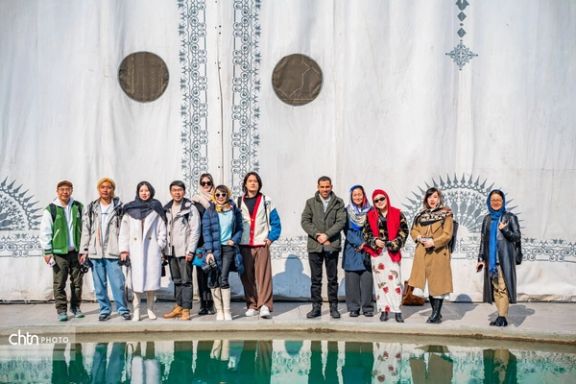
Iran's plan to host 20 Chinese influencers has been slammed as a ploy to portray the country in a more positive light amid arbitrary arrests of foreigners.
Moslem Shojaie on Sunday announced the forthcoming visit of 20 Chinese influencers to Iran within the next two weeks, a propaganda visit to show the regime in a positive light.
Shojaie stated that the influencers, boasting "over 60 million followers" on social media, will embark on a journey across various cities under the project title "Hello Iran," aiming to generate pro-Iranian content on social media platforms.
"The Hello Iran project is planned and implemented in 12 provinces of the country with four themes: nature and climatic diversity, historical and cultural heritage, the Silk Road, and cuisine," added Shojaie.
The move by the Iranian government to grant travel permits to Chinese influencers comes in light of the detention of numerous Western travelers. The discrepancy sheds light on the regime's alleged hypocritical and discriminatory practices towards foreign visitors based on political affiliations.
While Western travelers have often faced arbitrary arrests and even espionage charges for exploring Iran's cultural heritage, the government's embrace of Chinese influencers illustrates a contrast in treatment. Critics argue that the preference for Chinese influencers reflects Iran's prioritization of economic partnerships over human rights and international norms.
Despite its rich cultural heritage and natural beauty, Iran continues to grapple with challenges in attracting foreign tourists, exacerbated by its history of detaining foreigners and dual nationals, along with societal constraints imposed after the Islamic Revolution of 1979.

Ten children have died in Iran due to the discontinuation of medication for Spinal Muscular Atrophy (SMA) in one month amid the country's worsening health crisis.
Ramak Heidari, CEO of the Iranian Dystrophy Association, expressed concern over the situation on Sunday, saying despite assurances from the ministry of health regarding the distribution of medication to SMA patients, “no Iranian medication has been produced or distributed.”
Moreover, the efficacy of existing medications has been questioned by the deputy minister, exacerbating the crisis.
Heidari condemned the actions as “unjustifiable excuses for discontinuing essential medications”, emphasizing that approximately 10 children affected by SMA have died in the past month alone due to the lack of treatment.
Spinal Muscular Atrophy, a rare neurological muscle disorder, severely impacts patients' motor functions causing muscles to become increasingly weak. The only validated medication, Spinraza, has shown efficacy in slowing down the progression of the disease.
The exorbitant price of Spinraza has led to attempts by the ministry of health to hinder its import under false pretexts such as “low effectiveness.” Consequently, many families have resorted to seeking treatment abroad to save their loved ones.
The medication crisis comes amid reports of illegal practices in the pharmaceutical industry. Shahram Kalantari-Khandani, head of the Iranian Pharmaceutical Association, highlighted the issue of non-pharmaceutical investors obtaining rare medications with fake prescriptions and selling them in the open market, further exacerbating the situation.
Last year, Mojtaba Bourbour, an official from Iran's drug importers union, disputed government officials' assertions regarding pharmaceutical self-sufficiency. He revealed that not only do up to 90 percent of raw materials come from countries like China and India, but some medications are also imported from China and marketed under Iranian labels.
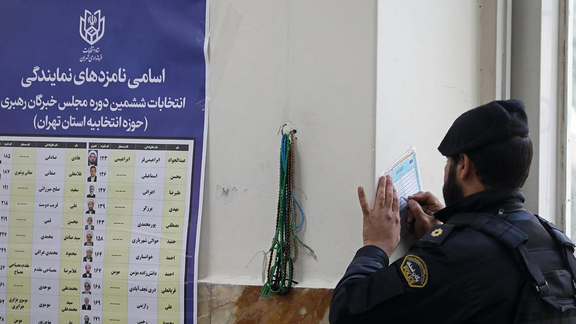
Two significant trends mark the orchestrated 2024 elections in Iran: the notable significance of invalid or blank votes and the strife among winning factions loyal to Khamenei.
Despite the objections of Khamenei's confidant, Gholam-Ali Haddad-Adel, the ultraconservatives fielded six lists for Tehran, whose representatives will wield considerable influence in parliament's management. Internal conflicts between pro-Khamenei factions are exacerbated in the absence of more moderate politicians who were barred from competing in the elections.
The unprecedented number of blank votes and the infighting among hardliners underscore Khamenei's waning influence over his supporters and the election manipulation apparatus.
Conducting rigged elections in the Islamic Republic has become increasingly challenging. Citizens capture videos from polling stations, revealing lower turnout than the government asserts. Furthermore, individuals can express discontent with the voting system by submitting invalid handwritten ballots. This tactic may also serve to avoid potential repercussions for non-participation, such as employment disqualification or promotion denial.
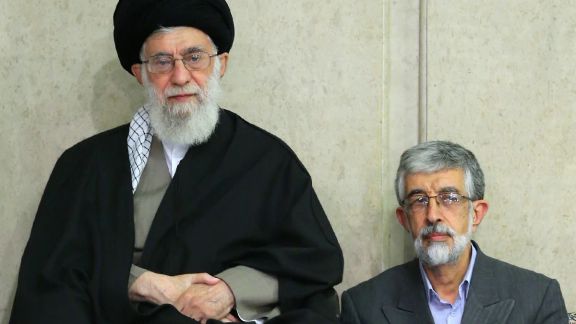
Voting for a popular footballer
An election boycott movement was underway for weeks. It was clear for months that most Iranians, deeply dissatisfied with the regime, would boycott the elections, and the decision by hardliners to keep other regime supporters out did not help the situation. Amid a low turnout, many of those who voted cast blank votes. Mohammad Mohajeri, a conservative commentator tweeted that the number of invalid votes were higher than the number of votes top contenders were able to get in Tehran.
Confirming the significant increase in the number of invalid votes, Didban Iran website wrote, "After counting 80% of the ballot boxes in Tehran, there were more than 380k invalid votes," even though the first person has about 340k votes.” The invalid written votes consisted of soccer symbols and names of footballers. In Yazd, the number of invalid votes is about 29,000, in second place.
It seems that invalid votes in Iran's engineered elections are gradually becoming a permanent phenomenon. In the presidential election of 2021, invalid votes came second after Ebrahim Raisi, at 13 percent. There are reports of 30% invalid votes in this parliamentary election.
People’s power
The Guardian Council and higher authorities aimed to manipulate both the candidate pool and public opinion through discretionary oversight. However, people are now countering these tactics by casting invalid votes, undermining the system's efforts to engineer public sentiment. Submitting invalid votes in the Islamic Republic serves as a means to avoid potential prosecution for abstaining from voting while simultaneously mocking the political establishment.
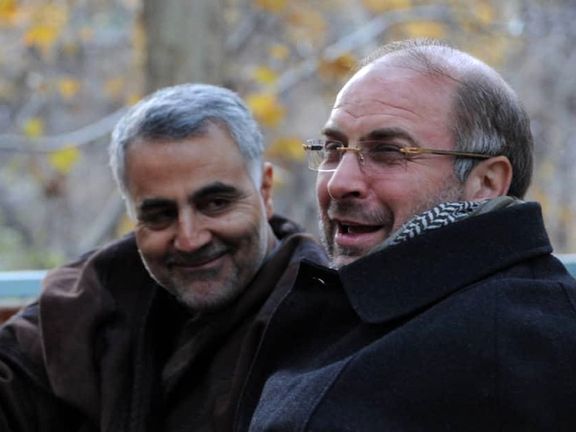
Engineered elections typically offer both advantages and drawbacks for the regime. With each repetition, however, the costs of these sham elections are outweighing their benefits. They increasingly embarrass the regime by exposing its lies, fraud, manipulation of numbers, and propaganda tactics to the public eye.
Insider infighting
Another consequence of engineered elections is the escalation of tensions among insiders vying for limited sources of power. In Tehran, after counting approximately two-thirds of the votes, Mohammad Baqer Ghalibaf, the former Speaker of Parliament, found himself in fourth place. Ghalibaf is now in competition with a member of the Mohammad Taqi Mesbah Yazdi cult, a cleric known for issuing fatwas sanctioning violence against those who defy Sharia law in their private lives.
The formation of a unified candidate list for Tehran was crucial for the hardline faction ahead of the election, but this did not materialize. Instead, six separate lists were published, each with its own distinct differences. Essentially, this divergence led to a war of competing lists, with Mesbah's followers, organized in the Paydari front, gaining ground over traditionalist Islamists. Even close associates of Khamenei, such as Haddad-Adel, who spearheaded the main list of fundamentalists, emerged as losers in this internal power struggle.
Ghalibaf’s speakership in jeopardy
To undermine Ghalibaf's influence and remove him from the speakership of the 12th Majles, supporters of Mesbah Yazdi employed various tactics to weaken Ghalibaf's allies. They insisted that Morteza Aqa-Tehrani, a prominent figure of the Paydari Front, be positioned as a top figure alongside Ghalibaf on the electoral list. Ultimately, Ghalibaf acquiesced to this demand, but the outcome reveals that some Paydari supporters refrained from voting for Ghalibaf.
Simultaneously, some of Ghalibaf's allies abandoned him midway and aligned with his adversaries. After parting ways with the Ghalibaf-Haddad united list, they joined other coalitions such as the "Amna" list. This coalition, led by Hamid Rasa’i allied with other fundamentalist groups to dismantle the Ghalibaf coalition. Rasa’i is recognized as one of the most extremist figures among the fundamentalist lists.
The role of Alireza Zakani, the mayor of Tehran, is also noteworthy in dealing a blow to Khamenei’s influence. Zakani spearheaded another list known as the United Front of the Revolution, which shared many similarities with the Paydari list. The recent elections appear to mark the beginning of the decline of Ghalibaf and Haddad Adel's influence in the legislature.

Iran's attempt to establish a permanent naval base on Sudan's Red Sea coast has been rejected according to a senior Sudanese intelligence official.
Ahmad Hasan Mohamed, intelligence adviser to Sudan’s military leader, disclosed that Iran sought to construct the base to monitor maritime traffic to and from the Suez Canal and Israel.
“The Iranians said they wanted to use the base for intelligence gathering,” Mohamed said in an interview with the Wall Street Journal. “They also wanted to station warships there.”
Mohamed stated that Iran had offered explosive drones to Sudan's military to combat rebel forces amid the civil war and proposed a helicopter-carrying warship in exchange for permission to build the base. However, Sudan rejected the deal to avoid straining relations with the United States and Israel.
Iran's pursuit of a naval foothold in the Red Sea aims to bolster its influence in one of the world's busiest shipping lanes, aiding Houthi rebels in Yemen to disrupt maritime traffic. Since November, the Iran-backed Yemeni militia has been blockading the route amid the Gaza war, in a bid to force Israel into a ceasefire. Instigated by Iran's supreme leader, the group has targeted Israeli linked ships and more recently, US and UK vessels in response to their support for Israel.
The backdrop of Sudan's 10-month-old civil war has become a battleground for regional powers vying for strategic influence. Sudan's military, engaged in conflict with paramilitary forces, has sought external support, including drones from Iran, to gain the upper hand in the ongoing conflict.
Iran has long been a primary provider of drones to Sudan, steadily enhancing the country's capabilities from surveillance to offensive operations.
The Iranian Revolutionary Guard (IRGC) has faced accusations of contributing to regional destabilization by supporting proxy groups in the Middle East and beyond. Critics argue that the IRGC's involvement in various conflicts raises concerns among international stakeholders about Iran's influence and its potential impact on regional stability.
